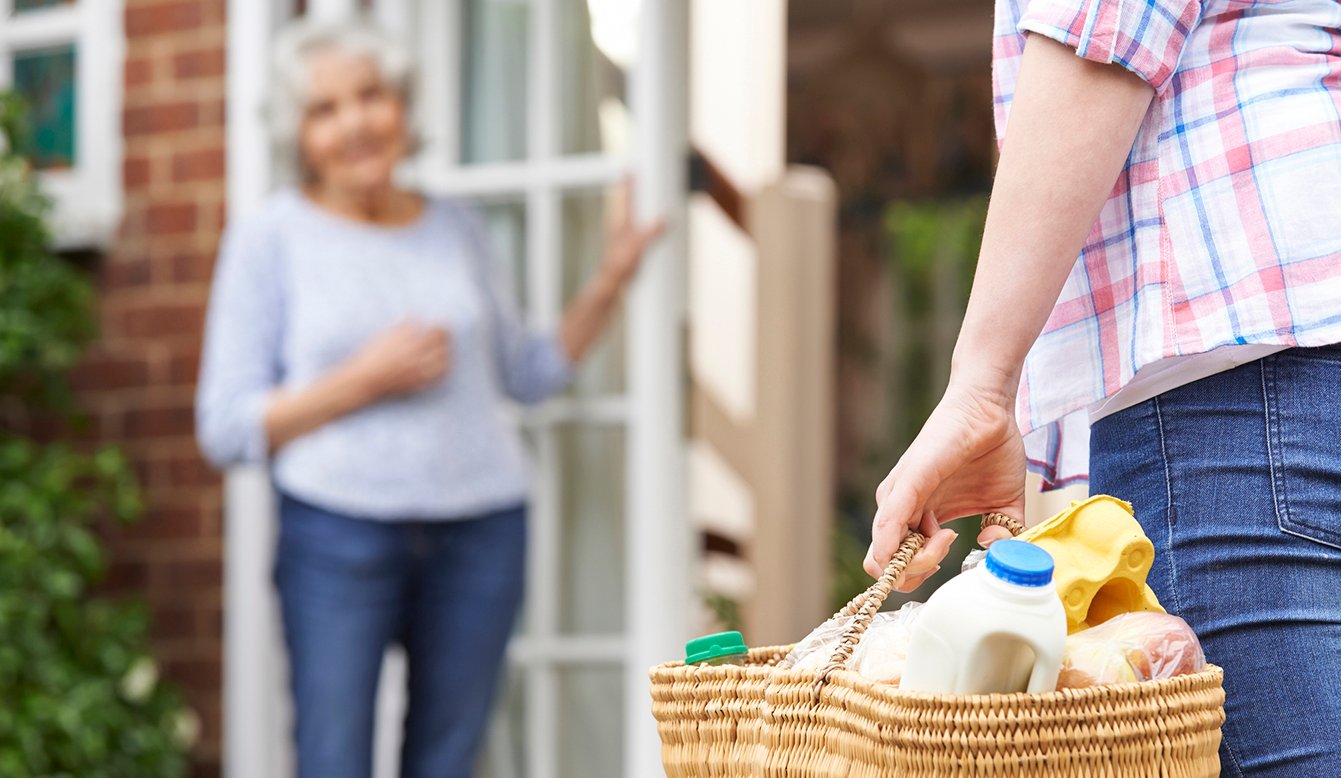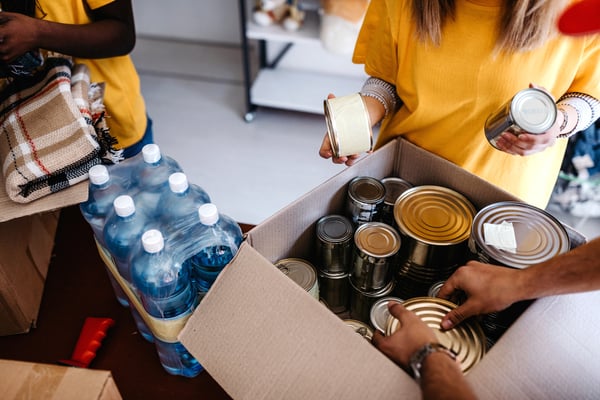How You Can Help Your Neighbors and Community | EYA Homes & Developments
September 28th, 2023
By EYA Homes
Neighborhood communities are among the most important ways that people find lasting personal connections. And for many, the value of supporting their community and helping neighbors has reached a new level of importance since the covid pandemic.
In this blog post, we'll talk about why community is important, what it means to be a good neighbor and what you can do to support your community and help your neighbors.
1. Why Community is Important
Research shows that Americans prefer living in places with a strong sense of community, and that tight communities can actually boost one’s mental health and improve resilience to difficult life events, such as illness or job loss. Especially in today’s harried and digitalized world, having a place where personal interactions are built-in and easily accessible can be crucial.
If you go out to pick up a coffee, you might cross paths with a neighbor who tells you about an upcoming street festival or lets you know that another neighbor is feeling ill and needs help. Even if you don’t run into a neighbor you know by name, you might see a “familiar stranger”—for example, someone who walks their dog at the same time every day or you often see walking to the Metro—and those little encounters can add up in a big way to create a well-rounded, healthier social life.
Another benefit to being part of a community is an added sense of comfort and security. For example knowing that a neighbor is looking after your home while you are on vacation or can keep an eye out for an important package can give you more peace of mind.
2. What It Means to Be a Good Neighbor
Being a good neighbor can include many qualities, but essentially it is treating people the same way you'd like to be treated yourself—with respect, kindness and trust to name a few.
Whether you are moving into a new neighborhood or someone else has recently moved into yours, start off on the right foot by introducing yourself early on. As time goes by, maintain good neighbor etiquette by greeting people you pass, respecting noise levels, helping to maintain the neighborhood (and your curb appeal), being there for a neighbor in need and more.
And while some neighbors may be very social, others may be more quiet and prefer to have time on their own. Respect people's boundaries, both time and space. As long as they know you are a trusted neighbor who has their best interest at heart, that can go a long way.
3. How You Can Help Your Neighbors & Community
We’ve compiled a list of ideas for how you can help your neighbors and support your community below.
- What You Can Do for Older Relatives and Neighbors
- What You Can Do for Neighbors with Young Children
- What You Can Do for Your Local Community Members
- What You Can Do for Your Community’s Pets
Learn more about EYA neighborhoods
What You Can Do for Older Relatives and Neighbors
Here are a few ways to provide help, care, and kindness to your older neighbors and relatives:
- Check in – Simple to do, this small gesture can have big impact. Make a phone call, leave a card, or drop off a favorite treat to let your neighbors know you're there and thinking of them. Add a note with your contact information to remind them and their caregivers how to reach you.
- Drop off groceries – Check in with older neighbors before your next trip to the grocery store to see if they need you to pick up anything for them. Alternately, if you get groceries delivered, see if you can help set them up with the same service you use, especially if they struggle with new technology.
- Pick up their prescriptions – Many grocery stores double as a pharmacy. If you are able to take your next grocery trip where they get their prescriptions dropped off, see if you can save them a trip. On your way home, leave the bag in their mailbox, on their front step, or somewhere they can safely and easily grab it.
- Help with digital set-up – While they may have embraced the basics, there are more online resources than ever for entertainment, classes, and connecting with their families and friends.
- TV & movies – If they’re having trouble connecting their devices to access online catalogs of books and movies through the many streaming services available, set up a video or phone call to help them through the process.
- Books & music & podcasts – Many services are offering more free audiobooks, TV shows, and more. Apple Podcasts enables customers to access a vast amount of free podcasts, and Amazon's Audible offers a month of free access to its entire platform of audiobooks and podcasts. A few other digital content channels they can explore could be setting them up with a free Spotify account or teaching them how to download podcasts that would interest them the most.
- How to video chat with their families & friends – Adjusting to software and app updates can get confusing. Help them stay on top of technology, set up their account, and practice their video capabilities so they can get comfortable with the latest versions of Facetime and video chat platforms.
- Online games – From card games to board games to group games, there are seemingly infinite online options for playing games with family and friends virtually. Here are a few resources to check out:
- Online classes – Depending on their interests, many resources have now gone online. Teach them how to access TED Talks, help them enroll in an online poetry class, or choose from a wide variety of free educational courses.
- TV & movies – If they’re having trouble connecting their devices to access online catalogs of books and movies through the many streaming services available, set up a video or phone call to help them through the process.
- Offer to walk their dog, deliver food, or water their outdoor plants – If you are able, offer to help out with their pet care. Pet food is notoriously heavy and difficult to transport, especially during trips to the store where you’re already stocking up as much as possible. See if you can either pick some up for them or help set up a subscription for delivery. If they need some help getting their dog the type of exercise they’re used to, offer to take Rover on a long walk.
- Care package – Sometimes just the reminder that someone is thinking about you is more than enough. Consider putting together a care package you can drop off. If you have kids, let them get creative with what goes in the box, as well as decorating the outside. Fill it with their favorite snacks, a few self-care items you can find at the grocery store like hand lotion or scented candles, and maybe some homemade cookies. Make sure to include a handwritten note or homemade card to top it off and make their day.
What You Can Do for Neighbors with Young Children
Here are a few ways to help out your neighbors with young kids:
- Offer to babysit – You could offer to spend an hour, or a few hours, entertaining the kids at your home or theirs. Choose a time where parents can get some work done during the day or give them some relief in the evening so they can relax on their own or have a date night. Here are a few ideas for ways to entertain the kids during your babysitting session:
- Read them a story
- Make a craft together
- Show them a magic trick
- Share cute YouTube clips
- Play with your pets
- Teach them something
- Play a game like Uno or classic board games
- Write a story together – make it fun and silly and switch off who gets to tell the story as you annotate
- Play Mad Libs – have the kids fill in the silliest words they can think of
- Take a field trip to a new place in the neighborhood
- Set up an playdate with your kids – Set up an playdate for them to see their classmates and neighbors. Plan an activity or two for the kids to do together from the list above like creating the same craft and let them take over.
- Pick up some essentials for them - We often think of our older neighbors and relatives first, but those with small children may be struggling to get to a grocery store and stock up on all that they need, especially if they’re going through their supplies faster. From diapers and baby food to snacks and supplies, take a moment to check in with your neighbors with small children to see if you can pick them up anything on your next trip to the grocery store.
- Add some non-essentials to your cart – While shopping for supplies, see if there are creative activities you can come up with for the kids from items you can buy at the grocery store. Some grocery stores have an office supply aisle with coloring books, construction paper, colored pencils, and other crafting materials. Peruse the baking aisle for food dye, baking supplies, and rainbow sprinkles for an at-home baking lesson. You can even pick up party supplies like themed cups and plates to have a special celebration or tea party with their favorite stuffed animals.
For the adults, consider picking up a bottle of wine, a bag of fresh coffee, treats they can keep out of the kids’ reach, or even some self-care or home supplies like face masks, new plug-in scents, extra laundry detergent, or air fresheners. - Lend them your favorite games – If you’re an empty nester holding on to your kids’ old toys or doing some spring cleaning and stumbling upon old board games from the 90’s, see if parents nearby would be interested in borrowing them. It will provide some new entertainment for the kids and also be a nice throwback for the parents.
What You Can Do for Your Local Community Members
Here are a few ways you can help those in your community from local businesses to nonprofits and more:
- Communicate with your community – Join or start a group chat, a Facebook group, a chain of emails, a Google Doc – whatever method, choose a space for your neighbors to come together and support each other. This forum can become an exchange to connect those with needs to neighbors who can help run errands, schedule small gatherings or virtual game nights, or just offer emotional support as a way to check in.
- Support local businesses – Here are a few ways you can support local businesses:
- Order food for delivery or pick up as much as you can
- Purchase gift cards from your favorite restaurants and shops to use at a later date
- Write positive online reviews for your favorite businesses
- Think outside the box of what types of local businesses you can support. Do you have instruments that need a tune up? Can you order board games from a local toy store? New outfits from a local boutique? Home décor from a local shop?
- Surprise a friend with an order from a local shop
- Share and tag how you’re supporting local businesses on your social accounts. Tag a snapshot of your delivery dinner or a photo of your pet supplies you ordered to show your support and encourage others to do the same.
-
- Here are a few resources for additional ways you can support local businesses in Washington, DC, Maryland, and Virginia:
- Here are a few resources for additional ways you can support local businesses in Washington, DC, Maryland, and Virginia:
- Support Local Nonprofits - Whether you’re donating your time, clothes, food, or services, both local and national organizations are working to provide relief, help, and support to those who need it most. To learn more about some of the many great charities to support, click here.
What You Can Do for Your Community’s Pets
Here are a few ways you can provide support and assistance to your community's local pets, pet stores, and animal shelters.
- Support local pet shops – From treats and toys to food and litter, see if you can pick up your pet supplies from a local pet store or have them delivered to your front doorstep. Rather than pick these up at a grocery store chain, take a look at how you can support local pet stores instead.
- Foster and/or adopt – Adopting a pet can be a wonderful experience. But even if you aren't ready to adopt a new best friend, fostering can be the next best option. This not only gives shelter pets the benefits of living in a home environment with loving care, but also helps to open shelter space for more animals. Here is a resource to get you started:
- Offer to help neighbors with their pet care – If you are able, see if you can help out your neighbors with their pet care, especially those who are unable to go on long walks with their dogs or go to the store to pick up supplies.
- Donate & support – There are many ways in which you can support your community’s animal shelters. If fostering or adopting isn’t an option for you, consider donating supplies, offering to help transport foster animals, or even coming up with a fundraising idea to help them stay afloat. Nonprofits like The Humane Society and ASPCA are also working to make it as easy as possible to provide help and support to animals in need.
Being a good neighbor and helping to support your community can have many positive effects both in your life and the lives of people around you. Click here to read more about how to create and cultivate a sense of community.
This article was originally posted on April 9, 2020 and has been updated to ensure content is as relevant, timely and helpful as possible for readers.






